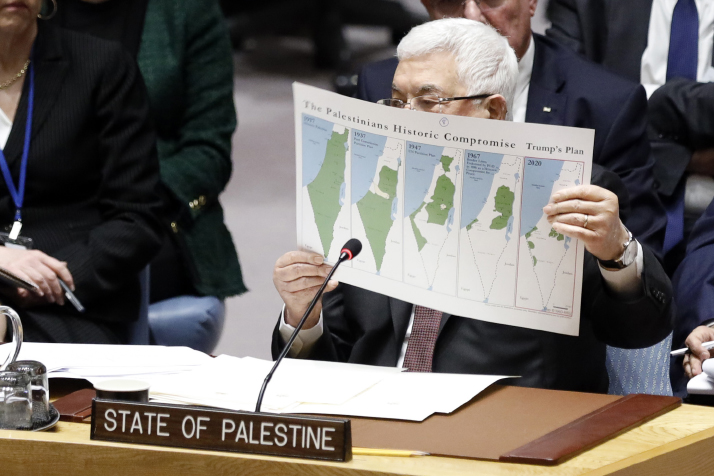| World |
| The Real Motive | |
| U.S. Middle East peace plan boils down to a bid to win votes | |
|
|
 Palestinians protest against the U.S. Middle East peace plan in the West Bank on January 29 (XINHUA)
The Israeli scenario It is obvious that the plan was driven by the political circumstances in both the U.S. and Israel. Trump invited not only Israeli Prime Minister Benjamin Netanyahu, a close friend, to Washington to be briefed on the plan before it was partially announced, but also Benjamin Gantz, Netanyahu's competitor and leader of the Blue and White Party. The plan calls for a two-state solution while recognizing Jerusalem as Israel's "undivided capital." Washington would also recognize Israeli settlements in the occupied West Bank, while Israel would agree to a four-year freeze on new settlement activities during the negotiations over the parameters of the Palestinian state. Predictably, the plan was rejected by the Palestinians. Netanyahu supports upholding rightwing policies in regional issues. He favors constructing more Jewish settlements in both East Jerusalem and the West Bank to expand the area under Israel. He also favors cracking down on Hamas in Gaza and Hezbollah in southern Lebanon. He has been Israel's prime minister for the longest time since modern Israel was established, in the post for nearly two decades. He has close private ties with Trump. The Kushners, the family of Trump's son-in-law Jared Kushner who advised the president on the plan, have very close business ties with Netanyahu. After becoming president in 2017, Trump recognized East Jerusalem as the capital of Israel and the disputed Golen Heights as the territory of Israel. Along with Trump's maximum pressure strategy toward Iran, an enemy of Israel, these activities are seen by international analysts as support for Netanyahu amid the intensified political rivalry in Israel. Netanyahu faces two challenges right now. The corruption scandals related to him and his family might drive him out of power, and Gantz's party has become the most pressing challenger to his Likud Party. In elections in 2019, the Blue and White Party became the biggest party in parliament but failed to form a government since it could not get enough support from other political parties to forge an alliance. The failure was due to Gantz's political stance. His party's allies in parliament are central and left parties, which rightwing parties regard as their enemy. Gantz would need to shift his stand for the election in March and woo rightwing parties. So supporting Trump's peace plan rather than rejecting it like he did in 2019 is more important to Gantz in his bid to become prime minister.  Palestinian President Mahmoud Abbas holds a map showing past Palestinian land compromises as he addresses a UN Security Council meeting on the situation in the Middle East in New York on February 11 (XINHUA)
Shift in attitude The quest for peace in the Middle East is one of the most challenging issues in international affairs. Generations of politicians and experts failed in their efforts. The issue concerns not only the occupation of Palestinian territories by Israel, but also the competition between modern Arab states and traditional Islamic states. In addition, the Israel-Palestine issue has been used by different world powers as an important tool to dominate the region. Therefore settling the Palestine issue is a highly sensitive task that can't be done easily, even with the mediation of international actors. The U.S. has been an important mediator and a major player in the Middle East for more than half a century. In the 1990s, with the fall of the Soviet Union and the end of the Cold War, the political structure in the Middle East significantly transformed. It was then that the opportunity for peace negotiations between Israel and Palestine appeared, and the U.S. gradually became the only reliable mediator in the negotiation process. The U.S. involvement was due to several factors. Washington hoped to maintain an alliance in the Islamic world to control extremists' hostility. It has also supported the state of Israel against its neighbors. The U.S. hoped to maintain stability in the Middle East to protect the supply of oil from the region to the North American market. Therefore, it was important to construct a positive image of itself through direct and active involvement in the Israel-Palestine peace process. From George H.W. Bush to Barack Obama, every U.S. president has come up with a plan to facilitate the negotiations between Israel and Palestine and create a positive environment for the U.S. in the Middle East. However, the traditional U.S. concerns in the Middle East have changed, especially after 2011. After the Arab Spring movement erupted in 2011, many traditional Arab powers, especially Egypt and Syria, were significantly weakened and their threat value to Israel decreased. With Israel already controlling East Jerusalem and most parts of the West Bank, the U.S. no longer needed to play an active role in the Israel-Palestine peace process. In addition, the U.S. dependence on Middle East oil waned. It became the world's largest oil producer in 2019 due to the development of shale oil extraction technology. It is now a competitor of Arab oil-producing states, rather than an important buyer as it was before. Over the past years, the U.S. administration, under both Republican and Democratic presidents, suggested a few main frameworks for the peace process. Nearly all were based on the UN principle of two states for two peoples. However, the negotiation process has become a zero-sum game with no one able to put forward a plan accepted by both Israel and Palestine. So at this juncture, the only driving force for Trump to put forward yet another Middle East peace plan is to earn political support at home for the upcoming presidential election. The author is an associate professor with the Institute of Middle East Studies of Northwest University of China _________ China's Stance In response to a question on the U.S.-proposed Middle East peace plan, Chinese Foreign Ministry spokesperson Hua Chunying made the following remarks on January 29: We believe the Palestine issue should be resolved on the basis of relevant UN resolutions, the principles of a "two-state solution" and "land for peace" and other international consensus, which should all be observed. To make any plan on the Palestine issue, it is important to heed the views of parties concerned, especially the Palestinian side. Agreements in this process should be reached through equal-footed dialogue and negotiation. Any plan should help resolve the issue as soon as possible in a comprehensive, fair and lasting way. (Source: Ministry of Foreign Affairs) Copyedited by Sudeshna Sarkar Comments to yanwei@bjreview.com |
|
||||||||||||||||||||||||||||
|